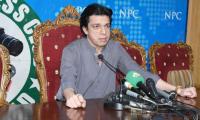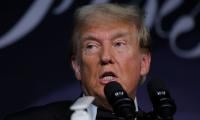LAHORE: Founded with a lot of fervour on September 20, 2020, the 11-party Pakistan Democratic Movement (PDM), which comprises of Pakistani Premier Imran Khan's arch political foes, visibly stood jolted Tuesday when Asif Zardari urged his current ally and an adversary of yesteryear, Nawaz Sharif, to fly back home if he was prepared to fight a war against the sitting regime and categorically refused to resign from the assemblies.
In reply, Maryam Nawaz promptly sought Asif Zardari's guarantee if her ailing father's return would not endanger his life in Pakistan, hence signifying a high level of mistrust and the underlying political differences.
The PDM was formed at a juncture when both leaders of PPP and PML-N were being publicly targeted by the incumbent Pakistani prime minister for allegedly plundering the national coffers during their respective stints in power.
But this is not the first time when Pakistan Muslim League-Nawaz (PML-N) and the Pakistan People's Party (PPP), country’s major political parties, have failed to live up to each other's expectations after forming a need-based accord.
However, despite their historic enmity since the signing of the 'much-trumpeted' Charter of Democracy in London on May 14, 2006, these two political entities have been forging such short-lived pacts, though their love-hate relationship has seldom reaped desired results during these last 15 years. In fact, they have scrambled to find ways to build a working relationship against regimes that were against both of them.
A nostalgic fly back into history reveals that following late Benazir's return on April 10, 1986 against the wishes of General Zia, her intense tussle with Nawaz Sharif had commenced.
By this time, Sharif had nourished close relations with the-then ISI Director-General Lieutenant-General Hamid Gul, who was brainchild behind the formation of the Islami Jamhoori Ittehad.
In early 1989, the PPP government in Islamabad had failed to oust Sharif through a no-confidence motion in the Punjab Assembly, after the sitting chief minister had managed to retain power by a vote of 152 to 106. This actually was the advent of worst horse-trading in country’s history as assembly members were reportedly bought by both Benazir and Nawaz Sharif for their own ends.
Nawaz Sharif became Pakistan’s prime minister in November 1990, while he was heading the Islami Jamhoori Ittehad.
After the 2008 elections, which were held after Benazir Bhutto's assassination, PPP and PML-N embraced each other, but their amity could not last long.
The two major partners in the four-party coalition had actually failed to agree to the mode of restoration of judges, who were deposed under the imposition of emergency on November 3, 2007 by Gen Pervez Musharraf.
And then both parties got involved in their characteristic mud-slinging tactics and sledging business on media. We all remember that in December 2012, the-then Punjab Chief Minister, Shahbaz Sharif, had accused Asif Ali Zardari of robbing the nation of billions of rupees, adding he would retrieve its looted wealth from the sitting president by "ripping his tummy apart."
After the PML-N had returned victorious during the 2013 elections to form a government, the PPP leadership had opted to extend a shoulder to the-then government for full two years, from June 2013 to June 2015.
And then came the most crucial support from the PPP, after Imran Khan and Tahirul Qadri had led a long march to Islamabad in August 2014, followed by the sit-in and the storming of the capital's Red Zone by their supporters. On August 29 of the same year, Chief of the Army Staff, Gen Raheel Sharif, had met both Imran Khan and Tahirul Qadri. This meeting with the Army Chief had made Imran famously say, “The referee had raised his finger.” And somehow, cutting it short, the PML-N government had survived the 126-day long protest led by Imran Khan and Tahirul Qadri.
And then came the “Panama Papers” on April 2, 2016. The trove of leaked documents from the Panamanian law firm “Mossack Fonseca” had changed the Pakistani politics, as Pakistan Supreme Court had dismissed Nawaz Sharif on July 28, 2017 in a corruption case, which had stemmed from these Panama Papers.
On March 28, 2018, deposed prime minister Nawaz Sharif had expressed his regrets over taking the Memo Gate controversy to the Supreme Court in 2011.
Subsequently, a Commission headed by Justice Qazi Faez Isa had conducted the inquiry and submitted its report to the apex court. The matter has been pending before the Supreme Court since then.
The Memo Gate controversy, we all know, had triggered a confrontation between the then government and the military leadership.
During March 2019, Asif Zardari’s son Bilawal had met the imprisoned Nawaz Sharif at Lahore’s Kot Lakhpat jail and inquired about his health. Nawaz Sharif was then behind bars, serving a seven-year prison term at Lahore’s Kot Lakhpat Jail since December 24, 2018 when an accountability court had convicted him in the Al-Azizia Steel Mills corruption reference.
He had got a six-week bail in between for medical treatment, but was again sent behind bars by the Supreme Court. And the rest is all very recent history!
CJP Justice Yahya Afridi convenes meeting of Judicial Commission of Pakistan on December 6
VPN demand escalated further on November 26, reaching 213% above baseline
Rehman declared that current government is a product of electoral manipulation
CM mentioned that priority measures are being taken to bridge gap between state and youth of Balochistan
K-Electric announces respite for people of Karachi by revealing plans to double country’s renewable capacity







